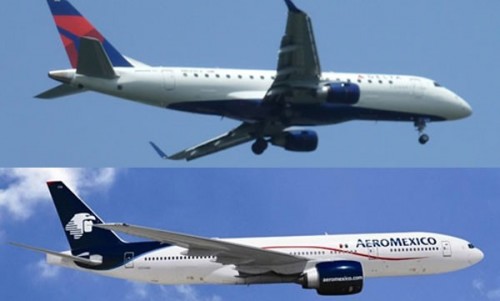Delta and Aeromexico’s joint venture plans have moved closer to realization in the past month. In late April, Mexico’s Senate approved a new air service agreement with the U.S. that would permit a joint venture arrangement.
Shortly thereafter, Mexican regulators approved the proposed Delta-Aeromexico joint venture. The approval did come with some conditions. Most importantly, the two airlines will have to give up all eight of Delta’s slot pairs at Mexico City’s heavily congested airport.
Delta and Aeromexico have announced that they will accept these conditions. Assuming that the U.S. also approves the joint venture — which is not guaranteed — Delta and Aeromexico could begin cooperating later this year.
More slots for Volaris?
The Aeromexico-Delta joint venture, if it is cleared by the U.S., could help top Mexican ultra-low-cost carrier (ULCC) Volaris in two ways.
First, it may be able to pick up some more slots in Mexico City. Volaris has been growing rapidly in recent years, but it has been unable to add flights in what is by far the largest market in Mexico. Instead, Volaris has started adding larger A321 aircraft to its fleet in order to meet demand in Mexico City.
When I spoke to Volaris CEO Enrique Beltranena two months ago, he didn’t see much hope of gaining additional slots in Mexico City. However, Delta now needs to give up eight slot pairs to meet regulators’ conditions, creating an opportunity.

Many airlines are likely to be interested in picking up these slots. However, Volaris’ position as Aeromexico’s strongest competitor in Mexico and its small current portfolio of Mexico City slots give it a good shot at winning at least some of the slots. (Volaris representatives did not respond to a request for comment.)
More customer segmentation in the cards
A second way that a Delta-Aeromexico joint venture could help Volaris is through increased capacity and pricing discipline at Aeromexico.
Delta sees Aeromexico’s position as the only full-service airline in Mexico as its key competitive advantage. As a result, Delta is likely to push Aeromexico executives to focus on better serving business travelers rather than competing mainly on price with ULCCs like Volaris. (To put it another way, it wants Aeromexico to be more like Delta.)
A strategy shift like that could help protect Volaris from a repeat of the price war that broke out in 2014 when Aeromexico decided to slash fares to regain market share. The price war damaged both companies’ profitability during 2014 without impacting the long-term market share trend.
Room for multiple winners in Mexico
Mexico’s airline industry is fairly concentrated, with four airlines dominating the domestic market: Aeromexico, Volaris, Interjet, and VivaAerobus. With the exception of Volaris and the much-smaller VivaAerobus — which are both ULCCs — the carriers all have distinct strategies and target markets.
Given the massive growth potential of the Mexican air travel market, there’s room for multiple winners in the years ahead. Joining forces with Delta could help Aeromexico significantly improve its profitability. But this development could also open up new opportunities for rivals like Volaris.
By Adam Levine-Weinberg for The Motley Fool
Adam Levine-Weinberg owns shares of Volaris and Delta. The Motley Fool has no position in any of the stocks mentioned.
Source: fool.com



